INSIDE ISSUE 18.43 | OCT. 25, 2019
 BIG STORY: Lawmakers say 2020 session could get a little spooky
BIG STORY: Lawmakers say 2020 session could get a little spooky
NEWS BRIEFS: State guard not flushing enough with cash
COMMENTARY, Brack: Stop dividing America with words evoking racial terror
SPOTLIGHT: ACLU of South Carolina
MY TURN: E. Brack: Something a little different — jazz from Oscar
FEEDBACK: Why the need to impeach?
MYSTERY PHOTO: Big, white building
S.C. ENCYCLOPEDIA: Henry Laurens Pinckney
Lawmakers say 2020 session could get spooky

By Lindsay Street, Statehouse correspondent | There are plenty of hair-raising issues coming in 2020 for state lawmakers. Chief among them is what to do with state-owned utility Santee Cooper, according to legislators.
With Halloween around the corner, Statehouse Report thought it would be (forgive us) spooktacular to ask state lawmakers: What’s the scariest thing coming to the Statehouse in 2020?
More than 30 were called or texted and asked to respond. Only 10 gave answers.
The second year of a two-year session starts in January with thorny issues from restricting abortion access and whether to allow guns to be carried without a permit to how to shape the future of energy for millions of South Carolinians or how to alter how the the state educates children. But perhaps the scariest thing of all to many in South Carolina Every House member and every Senate member can seek reelection next November.
Legislators’ answers were mostly serious — and difficult to turn into a Halloween costume. Here’s what lawmakers had to say:
On Santee Cooper
Three lawmakers mentioned Santee Cooper, the state-owned utility that lost big on part-ownership of a $9 billion nuclear plant investment in 2017. In 2020, lawmakers will decide the utility’s fate — to sell it to a private entity, let a private entity manage it or restructure it to keep it public.
“The most significant (issue), that is the most complex, is whether or not to sell Santee Cooper, whether to have a management team come in or an alternative to that is to enact some reforms,” Beaufort County Republican Sen. Tom Davis said. “The implications of what we do will have an effect for decades to come.”

Orangeburg Democratic Sen. Brad Hutto called Santee Cooper “a big deal” and listed it at the top of the scariest things coming to Columbia in 2020.
“That’s probably the thing that has the biggest potential of long-term consequences for the state,” he said.
Senate Education Chair Greg Hembree, R-Horry, gave a more light-hearted answer:
“It is the army of zombie lobbyists representing companies that want to buy Santee Cooper,” he said. More seriously, he added: “When you get that many people that are all hired to achieve an objective, it can be hard — I don’t know if we always make the best decision with that much pressure … The scary part is if we don’t make a good decision because of that effort.”
Hembree expected lobbying activity to hit a “fever pitch” in February and March, about the time House and Senate committees are expected to make recommendations about Santee Cooper’s fate.
On education
During the off-session, the Senate has been taking a hard look at the House-passed education overhaul package (H. 3759). The package seeks to raise the minimum starting teacher salary to $35,000, gives the state education superintendent more ability to take over low-performing school districts and creates a $100 million fund to bring businesses to areas with poor and struggling schools.
For Charleston Republican Rep. Lin Bennett, the scariest thing in 2020 could be the Senate dismantling or “weakening” the bill or “that we don’t get the education reform bill right.”
“They have been holding hearings all summer long so I don’t know what it’s going to look like,” she said. “We just need to get some of this administrative or ‘edu-crat’ stuff out of the classroom. That would be frightening because it wouldn’t be a change.”
On guns and abortions
Columbia Democratic Rep. Beth Bernstein said what scares her most about the 2020 session is the House-passed bill that bans abortions after most women know they are pregnant (H. 3020), and a Senate bill that would allow a person to carry a gun without a permit, known as constitutional carry (S. 139).

A Senate Medical Affairs subcommittee has been holding hearings on the so-called fetal heartbeat abortion bill in the off-session.
“It’s scary to me that as a legislature, we are legislating medical procedures,” Bernstein said. “It’s a decision to be made with the patient and her doctor. That type of legislation is always troubling for me.”
Constitutional carry of guns is awaiting third reading in the Senate when lawmakers reconvene.
“(It’s) very alarming to me,” Bernstein said. “We need to have sensible gun safety legislation and constitutional carry would not be helpful in that initiative that I support.”
Hutto, who helped to kill the 2017-2018 abortion restriction bill that sought to give “personhood” status at the moment of conception, said the two bills don’t scare him.
“We’ll debate abortion again, but we do that every year so that’s not scary. We’ll debate guns again, but we do that every year so that’s not scary,” Hutto said. “They’re not scary because they’re normal.”
On medical marijuana
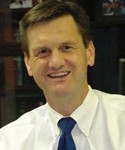
The House and the Senate have yet to pass a bill legalizing medical marijuana in the state. The effort is largely being pushed in the Senate through Beaufort Republican Tom Davis with S. 366. The bill has had multiple hearings through a Senate Medical Affairs’ subcommittee.
In the House, House Minority Leader Todd Rutherford of Columbia is a sponsor of similar legislation, which remains in the Judiciary Committee.
“What would scare me the most is if we don’t get medical marijuana passed,” Rutherford said. “People are demanding it and I’m tired of making excuses … There’s simply no reason why we haven’t done it.”
On politics and time
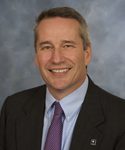
House Speaker Pro Tempore Tommy Pope, R-York, said while “everything we do is so serious and important … the scariest thing is that all these people you sent down to Columbia are up for reelection.”
Hutto also mentioned reelection, saying many General Assembly members would be a bit spooked by that.
Senate Majority Leader Shane Massey of Edgefield also mentioned politics.
“One thing that concerns me is the vitriol of national politics seeping down from Washington making it even more difficult to do what people expect us to do,” Massey said. “It’s already hard enough … but when you bring in all this external stuff that definitely has an impact.”
Sen. Katrina Shealy, R-Lexington, said the Senate has a number of appointments to weigh for state offices.
“Appointments are going to be a nightmare,” she said. Appointments to be considered include those for leaders of state departments dedicated to natural resources, aging and veterans. “We all know how long these appointments take and we can’t do anything about them until we start back in January and then we only have four or five months to work on them.”

Rep. Raye Felder, R-York, said she was concerned about the “time crunch.”
“It’s the second year of a two-year session so you’re up against that clock,” Felder said. “That’s the scary part: how do you prioritize what you’re going to work on first?”
- Have a comment? Send to: feedback@statehousereport.com
NEWS BRIEFS
State guard not flushing enough with cash
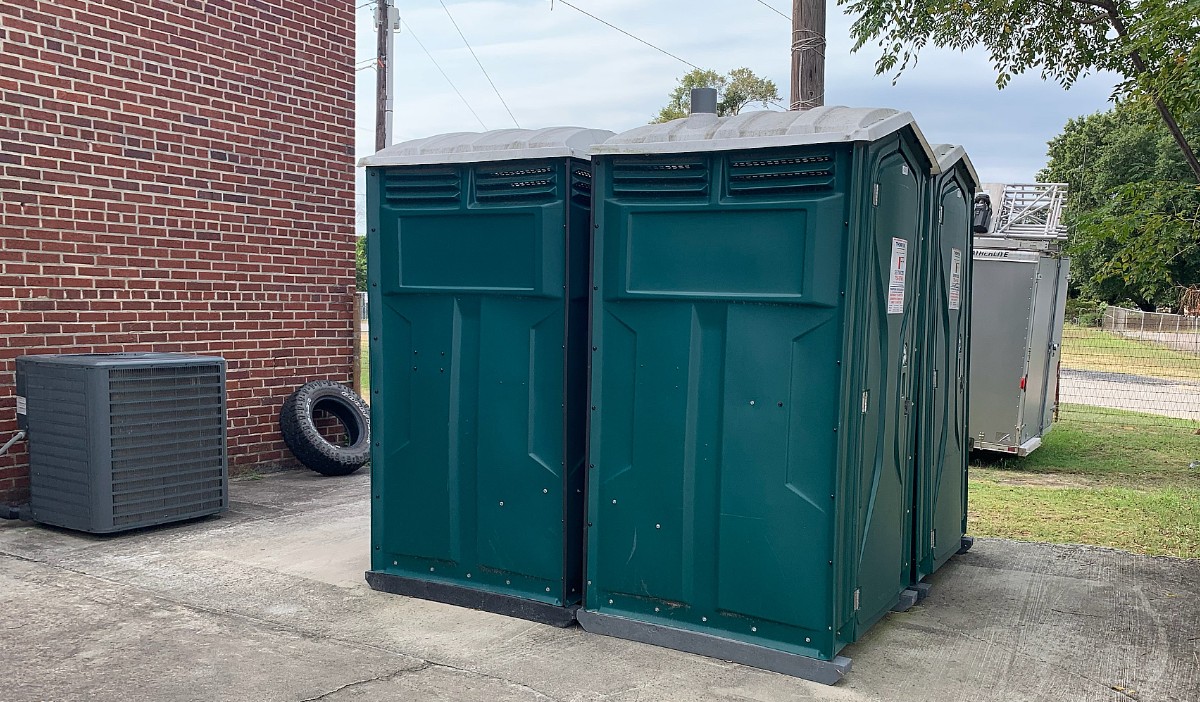
By Lindsay Street, Statehouse correspondent | The men and women called on to respond to manmade and natural disasters in South Carolina haven’t had access to showers or flushing toilets since 2015.
Over the last month, State Guard Commander Leon Lott has offered tours of the guard’s Columbia headquarters to any lawmakers interested in seeing the ghostly remains of bathrooms, the portable toilets and a termite-infested floor.
“You want scary? The bathroom situation at the State Armory is scary,” Sen. Katrina Shealy, R-Lexington, told Statehouse Report. She had just wrapped up a tour of the facility Monday when the publication called to get her take on the scariest things coming to the Statehouse in 2020. It was fresh on her mind, and it topped her list.
In the coming legislative session, Lott said he will ask lawmakers to dole out $1.2 million to allow the State Guard Olympia Armory in Columbia to tap into the city’s sewer system, and fix the ailing 1930s Art Deco, National Historic-registered building.
“It’s a cut-and-dried issue, and we felt like saying it is one thing but actually seeing it is another thing,” Lott said. “We wanted them to see first hand so when they go back and do the budget they can tell their colleagues they’ve seen the Porta-Johns.”
The problems stem back to the area’s historic flood of 2015. During the flood, the State Guard was mobilized and occupying the building. Then, the septic tanks began to flood — making the toilets and showers unusable. Since that time, four portable toilets have been rented monthly at the site. The monthly bill is small in comparison to the million-dollar fix ($320 per month).
“Yeah, but do you want to go to a Porta-John all the time? That is our headquarters. This is 2019,” said Lott, who took command in December 2018.
The building normally only has two full-time employees and two part-time employees, but when the soldiers are activated in an emergency, more than 900 can be housed there. All without running water. For long-term stays, soldiers often rent hotel rooms, Lott said.
“This is really the first time it’s been pushed (to be fixed). That’s a priority I placed when I became the commander,” he said. “We need to have an armory that is up to today’s standards with a bathroom and a floor. It’s necessities that sometimes we take for granted until you don’t have them, and we haven’t had them since 2015.”
In other news:
![]() USC board reduction bill to be heard Oct. 31. A Senate Education subcommittee will look at S. 798, a bill seeking to reduce the size of and restructure the University of South Carolina’s board, at 10:30 a.m. Oct. 31 in room 308 of the Gressette building at the Statehouse in Columbia. See the agenda.
USC board reduction bill to be heard Oct. 31. A Senate Education subcommittee will look at S. 798, a bill seeking to reduce the size of and restructure the University of South Carolina’s board, at 10:30 a.m. Oct. 31 in room 308 of the Gressette building at the Statehouse in Columbia. See the agenda.
Also on USC, Senate Select Committee to convene Nov. 14. The Senate Select Committee on USC’s Presidential Search Process convenes 1 p.m. Nov. 14 in room 105 of the Gressette building at the Statehouse in Columbia, according to a memo to committee members. An agenda has not been released yet.
- Related: Accrediting body to study USC’s presidential search for political influence.
- Previous coverage: Gubernatorial influence could affect USC’s accrediting.
Education funding study committee rescheduled. The Senate Education Funding Reform Study Committee has rescheduled its first meeting to 10 a.m. Oct. 29 in room 308 of the Gressette building at the Statehouse complex in Columbia. The committee will review the mechanics and methodology of the state’s education funding formula to determine what revisions and refinements are necessary to provide increased flexibility needed at the district level, while meeting the state’s objectives. See the agenda.
House panel to look at early childhood funding. The House’s Early Childhood Education Study Committee will hear from First Steps on its education funding model 10 a.m. Oct. 30 in room 433 of the Blatt building at the Statehouse in Columbia. See the agenda.
Senate Transportation panel looks at hands-free driving. A Senate panel will convene to look at S. 723, a bill seeking to make it unlawful to use a wireless phone while operating a motor vehicle, at 2 p.m. Oct. 29 in room 207 of the Gressette building at the Statehouse in Columbia. See the agenda.
House panel looks at civil asset forfeiture. There will be a meeting of the House Asset Forfeiture Policy Study Committee 10 a.m. Oct. 29 in room 110 of the Blatt building at the Statehouse in Columbia. See the agenda.
- Related: S.C. circuit court judge rules forfeiture was unconstitutional earlier this month.
- See The Greenville News’ series on the issue.
Reparations panel convenes Nov. 2 in Charleston. The National African American Reparations Commission, American Civil Liberties Union and the ACLU of South Carolina present “From Enslavement to Reparations: A 400 Year Journey for Justice” 1-4 p.m. Nov. 2 at Charleston Gaillard Center in Charleston. The event is free but requires registration. Click here to register.
Lancaster senator to retire. Longtime public servant Sen. Greg Gregory, R-Lancaster, will not seek reelection in 2020. See the story here.
Women punished for seeking psych help as inmates. Dr. Pamela Crawford told legislators Wednesday that female inmates at Camille Griffin Graham Correctional in Columbia were punished to reduce the number of people who reported being suicidal. Read the story.
2020 CALENDAR: Criminal justice forum in Columbia hosts 10 Dems, Trump
 President Donald Trump will address the 2019 Second Step Presidential Justice Forum today at Benedict College in Columbia. The event is kicking off a weekend focused on criminal justice reform.
President Donald Trump will address the 2019 Second Step Presidential Justice Forum today at Benedict College in Columbia. The event is kicking off a weekend focused on criminal justice reform.
Leading up to the event, billionaire and Democratic presidential hopeful Tom Steyer will hold a march in Columbia focused on calling for the impeachment of Trump. Here is a schedule of Democratic presidential candidates slated to speak during the forum on Oct. 26:
- 10:30 a.m.: Maryland Congressman John Delaney
- 11 a.m.: New Jersey Sen. Cory Booker
- 1 p.m.: South Bend, Ind., Mayor Pete Buttigieg
- 2 p.m.: California Sen. Kamala Harris
- 3 p.m.: Vermont Sen. Bernie Sanders
- 4 p.m.: Minnesota Sen. Amy Klobuchar
- 5 p.m.: Former Vice President Joe Biden
Here is the schedule of Democratic presidential candidates on Oct. 27:
- Noon: Massachusetts Sen. Elizabeth Warren
- 1 p.m.: former Housing Secretary Julian Castro
- 2 p.m.: Hawaii Congresswoman Tulsi Gabbard
- Click here to buy tickets.
Sanders to visit Columbia HQ. Vermont Independent Sen. Bernie Sanders will visit his state campaign headquarters 10 a.m. Oct. 26 at 1410 Blanding St. in Columbia. Sanders will offer brief remarks along with state Rep. Ivory Thigpen, D-Richland. Attendees should be prepared to participate in the door-to-door canvass immediately following the event. Entry is provided on a first come, first serve basis.
Delaney in Charleston today. Former Maryland Rep. John Delaney will speak at The Post and Courier’s Pints and Politics 4 p.m. today at Palmetto Brewing Co, 289 Huger St. in Charleston.
Booker makes Columbia stop Oct. 26. New Jersey Sen. Cory Booker will hold a canvass kick-off event noon Oct, 26 at 2361 Taylor St. in Columbia.
Tulsi holds town hall in Columbia. Hawaii Rep. Tulsi Gabbard will hold a town hall 3-5 p.m. Oct. 26 at Busby Community Center in Columbia.
Biden holds Florence town hall, makes remarks at Hartsville church. Former Vice President Joe Biden will hold a town hall 1 p.m. Oct. 26 at Wilson High School in Florence, and speak at 11 a.m. Oct. 27 at Jerusalem Baptist Church in Hartsville.
Harris holds canvass event Oct. 26. California Sen. Kamala Harris will speak at 3:30 p.m. Oct. 26 at a canvassing lunch at her campaign’s Columbia Field Office at 1919 Hampton St.
Buttigieg hits eight events in two-day sweep. South Bend, Ind., Mayor Pete Buttieg will hold seven other events in addition to the criminal justice forum, where he will appear Oct. 26. Those other events include:
- Speaking at Allen University Homecoming Tailgate at noon Oct. 26;
- A town hall 3:30 p.m. Oct. 26 at Rock Hill City Hall Amphitheatre, 144 E. Black Street;
- A roundtable with the Catawba Nation Leadership 5:30 p.m. Oct. 26 in Rock Hill (closed to the public);
- Remarks 8:45 a.m. Oct. 27 at AME Zion Regional Conference Worship Service in Rock Hill;
- A walking tour 1 p.m. Oct. 27 of Vietnam Veterans Traveling Memorial Wall in Rock Hill (closed to the public);
- A canvassing kickoff 2:15 p.m. Oct. 27 at 143 E. Main St. in Rock Hill; and,
- A community leaders roundtable 3:30 p.m. Oct. 27 in Rock Hill (closed to the public).
Warren hosts Florence town hall. Massachusetts Sen. Elizabeth Warren will host a town hall 3:30 p.m. Oct. 26 at Francis Marion Performing Arts Center in Florence. Info.
Castro hosts meet-and-greet in Columbia. Former Housing Secretary Julián Castro will hold a meet-and-greet 2:30 p.m. at Sowing Seeds, 211-A Lady St. in Columbia. Info.
Throughout the campaign season, we are working to keep South Carolina informed of candidate events in the state. Have an event you want us to know about? Email us at 2020news@statehousereport.com.
- Have a comment? Send to: feedback@statehousereport.com
BRACK: Stop dividing America with words evoking racial terror

By Andy Brack, editor and publisher | “Lynching” is a word that should be discarded from political discourse, especially throughout the South where thousands died from racial terror after the Civil War.
 President Trump, now under intense scrutiny in a growing impeachment inquiry by the U.S. House of Representatives, tweeted in a diatribe in the wee hours of Oct. 22 that “All Republicans must remember what they are witnessing here – a lynching.”
President Trump, now under intense scrutiny in a growing impeachment inquiry by the U.S. House of Representatives, tweeted in a diatribe in the wee hours of Oct. 22 that “All Republicans must remember what they are witnessing here – a lynching.”
No, Mr. President. You’re wrong. You are not being lynched. You are not being physically ripped from the White House, bundled up ropes and taken by a mob for execution by shooting, hanging, burning or something as horrible.
What is happening, sir, is that you are facing the very process you deny is happening – due process required by the Constitution to investigate whether you and your administration violated the law in discussions with a foreign country. For the U.S. House – Democrats and Republicans – to do less is for them to abrogate their sworn duty.
But because you don’t like what’s happening, can’t control it and want it to go away, you lash out, denigrate and act as unpresidential as any man to ever hold the top office in the land. Perhaps you’re trying to get people to pity you and massage your big ego. Perhaps you’re saying outrageous things to create further division, hoping to sweep under the rug any “Treason, Bribery, or other high Crimes and Misdemeanors” (Article Two, Section 4 of the U.S. Constitution) by your administration.
From 1877 to 1950, an estimated 185 South Carolinians were racially lynched, according to the Equal Justice Initiative. So using a word like “lynching” to describe a process required in constitutional law is beyond the pale. Even as a rhetorical flourish in political debate, it is dangerous and politically patronizing because it reinforces 19th-century attitudes on race. It causes fear. It exacerbates the political and racial divide in a country with a sorry history of dealing with its past sins.
Your political ally, South Carolina’s own U.S. Sen. Lindsey Graham, should know better, too. In a defense of you, he rightfully said lynching was mob rule, but he whitewashed its true meaning by failing to admit its violence: “Yes, African-Americans were lynched, other people have people lynched throughout history. What does lynching mean? That a mob grabs you, they don’t give you a chance to defend yourself, they don’t tell you what happened to you, they just destroy you.”
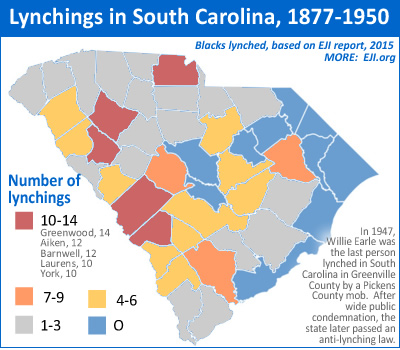 Most lynching victims ended up dead, as described in a horrifying column by Michele Norris of the Race Card Project in the Washington Post: “Lynching was a fact of life for much of this country’s existence. It was the green light for decapitating the victim and the impulse to place a head on a stick and then place that stick into the ground on a well-traveled road and leave it there until the sun or the birds or the vermin had their way. Lynching was sometimes not enough. Bodies were burned and blowtorched and branded. They were gutted and skinned like animals. They were castrated, scalped, dismembered.”
Most lynching victims ended up dead, as described in a horrifying column by Michele Norris of the Race Card Project in the Washington Post: “Lynching was a fact of life for much of this country’s existence. It was the green light for decapitating the victim and the impulse to place a head on a stick and then place that stick into the ground on a well-traveled road and leave it there until the sun or the birds or the vermin had their way. Lynching was sometimes not enough. Bodies were burned and blowtorched and branded. They were gutted and skinned like animals. They were castrated, scalped, dismembered.”
Yet the president is alive and kicking. He is flailing away, destroying civility and American institutions, as recognized by some of Graham’s congressional colleagues.
South Carolina’s Tim Scott, the Senate’s only black Republican, didn’t describe the impeachment inquiry as a lynching. Rather, he said, “There’s no question that the impeachment process is the closest thing to a political death row trial, so I get his absolute rejection of the process. I wouldn’t use the word lynching.”
House Majority Whip Jim Clyburn, a South Carolina Democrat, went further on CNN: “I’m a product of the South. I know the history of that word. That is a word that we ought to be very, very careful about using.” Clyburn said he recognized that Trump was “prone to inflammatory statements, and that is one word that no president ought to apply to himself.”
Yet the president continues to lash out at American institutions to try to save his hide. From now until the 2020 election, he’ll likely ramp up the rhetoric to create more division and fear. Stop it. It’s wrong. Face the music.
Andy Brack’s latest book, “We Can Do Better, South Carolina,” is now available in paperback and for Kindle via Amazon.
- Have a comment? Send to: feedback@statehousereport.com.
ACLU of South Carolina
 The public spiritedness of our underwriters allows us to bring Statehouse Report to you at no cost. This week’s spotlighted underwriter is the American Civil Liberties Union. The ACLU of South Carolina is dedicated to preserving the civil liberties enshrined in the U.S. Constitution and Bill of Rights. Through communication, lobbying and litigation, the ACLU of South Carolina works to preserve and enhance the rights of all citizens of South Carolina. Foremost among these rights are freedom of speech and religion, the right to equal treatment under law, and the right to privacy.
The public spiritedness of our underwriters allows us to bring Statehouse Report to you at no cost. This week’s spotlighted underwriter is the American Civil Liberties Union. The ACLU of South Carolina is dedicated to preserving the civil liberties enshrined in the U.S. Constitution and Bill of Rights. Through communication, lobbying and litigation, the ACLU of South Carolina works to preserve and enhance the rights of all citizens of South Carolina. Foremost among these rights are freedom of speech and religion, the right to equal treatment under law, and the right to privacy.
- More: http://www.aclusouthcarolina.org/
- Have a comment? Send to: feedback@statehousereport.com
Something a little different: Jazz from Oscar Peterson

By Elliott Brack, special to Statehouse Report | How about a little something different today?
 Let me introduce you to a 6.53 minute video with some of the most soothing music I have ever heard. The work comes from the late jazz virtuoso Oscar Peterson, and it is a composition of his own, which he entitled, “Ode To Freedom.”
Let me introduce you to a 6.53 minute video with some of the most soothing music I have ever heard. The work comes from the late jazz virtuoso Oscar Peterson, and it is a composition of his own, which he entitled, “Ode To Freedom.”
The short video came from one of my daughters, who knew that Oscar Peterson was my favorite jazz pianist. We have often enjoyed CDs of his music, amazed at his tremendous speed and dexterity in playing the keyboard. Yet, at this track below shows, Peterson could also play with great emotion and depth.
What I would like for you to do is listen here right on your computer to the music. It was first recorded in Denmark in the 1960s and somehow was preserved on video. I usually merely listen to the music, not actually keeping my eyes on the screen, but sitting back, often closing my eyes, and merely listening. It seems to me to be even more soothing this way, you don’t have to watch Mr. Peterson continue to whip his face from prodigious sweating while he works, or have to pay attention to the keyboard, or get distracted by the drums (Ed Thigpen) and bass (Ray Brown) in the background.
 Now, wasn’t that enjoyable? Don’t know about you, but once I listen to it, I often listen again. It calms and energizes me. First comes that slow, simple series of notes on the piano, and a little later the bass and drums quietly join in. Mr. Peterson carries this theme through two variations, before you hear those same notes in the background which tells me he’s about to go into another variation of his music. Even when he’s playing up-and-down the keyboard, often quite fast, still those same, almost-hidden notes come through, continuing the quiet theme. To me, that’s fantastic. So simple…..so elegant…so enjoyable.
Now, wasn’t that enjoyable? Don’t know about you, but once I listen to it, I often listen again. It calms and energizes me. First comes that slow, simple series of notes on the piano, and a little later the bass and drums quietly join in. Mr. Peterson carries this theme through two variations, before you hear those same notes in the background which tells me he’s about to go into another variation of his music. Even when he’s playing up-and-down the keyboard, often quite fast, still those same, almost-hidden notes come through, continuing the quiet theme. To me, that’s fantastic. So simple…..so elegant…so enjoyable.
Oscar Peterson was a Canadian, born in Montreal in 1925, and died in 2007. He was a big person, always smiling personality, and played the piano with a 14-note hand span. His early training was in classical music. He had his own weekly radio show at age 14, and grew in stature and style from there. One called him the “maharaja of the keyboard,” as he made over 200 recordings, and won eight Grammys. Another source called him “Possibly the most successful artist produced by Canada.”
His Oscar Peterson Trio featured Ray Brown on bass and Herbie Ellis on guitar. Later, when Ellis left, Ed Thigpen replaced him, this time on drums.
One source wrote that Peterson was a master of “cascades of many notes.” There is no doubt that he could really command the keyboard, sometimes pounding it with intensity, and at other times playing it like a cat purring. He continued to perform until 2006, though his public appearances were sporadic after a stroke in 1993 which affected the use of his left hand, and his ability to walk.
If you want to hear more of Oscar Peterson’s music, so much is available on the internet today. Just Google his name, and enjoy his music. How’s this for something different today!
Longtime Georgia journalist Elliott Brack edits and publishes GwinnettForum.com. Have a comment? Send to: feedback@statehousereport.com
Why the need to impeach?
To the editor:
![]() Thanks for writing the article about Tom Steyer. He makes a compelling commercial; however, I wonder why the “need to impeach.”
Thanks for writing the article about Tom Steyer. He makes a compelling commercial; however, I wonder why the “need to impeach.”
It’s pretty clear that the Democrats need is more to overturn an election based on, pardon the expression, Trumped-up charges. Why not try to beat him at the ballot box rather than try to drag the country through a faux impeachment process?
— Philip Tackett, Summerville, S.C.
Send us your thoughts … or rants
We love hearing from our readers and encourage you to share your opinions. But you’ve got to provide us with contact information so we can verify your letters. Letters to the editor are published weekly. We reserve the right to edit for length and clarity. Comments are limited to 250 words or less. Please include your name and contact information.
-
- Send your letters or comments to: feedback@statehousereport.com
Big, white building
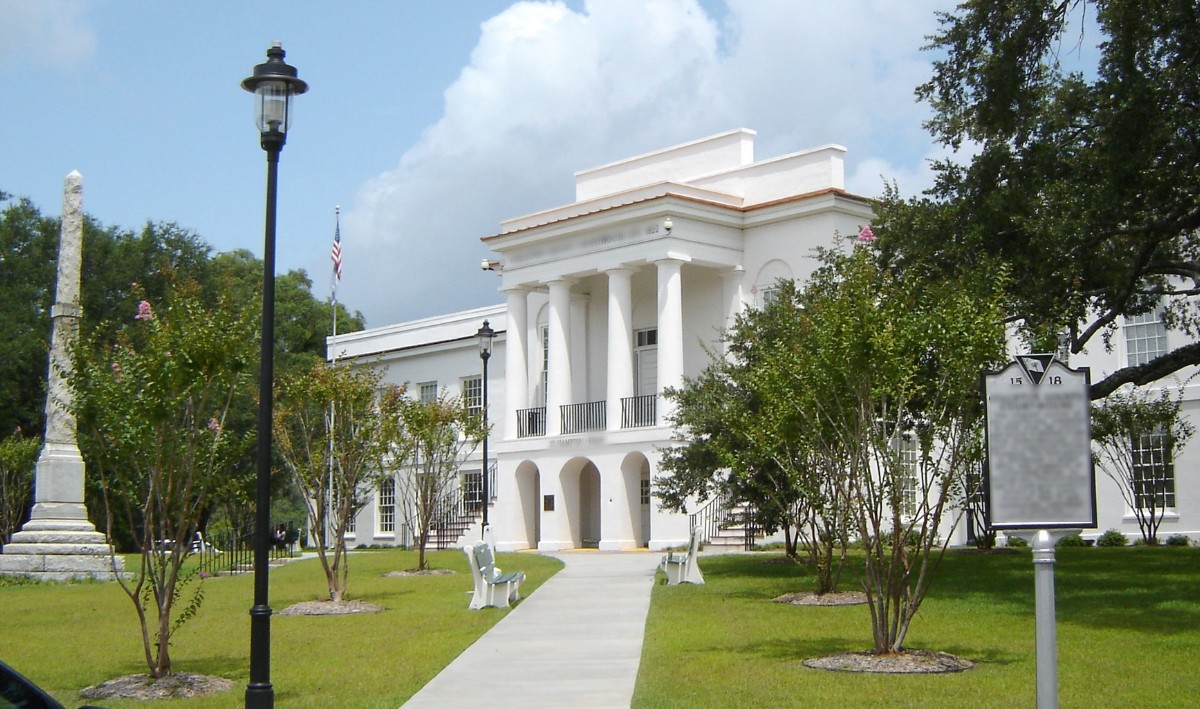
Wow! Does this building ever make a statement. But where is it? Send your guess about the location of this photo to feedback@statehousereport.com. And don’t forget to include your name and the town in which you live.
Our previous Mystery Photo
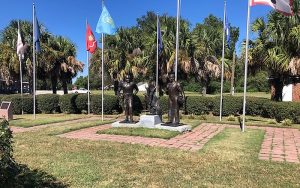 Our Oct. 18 image, “Mystery statuary,” is an art installation in Bishopville that shows three stages of hometown hero Felix Anthony “Doc” Blanchard, a winner of football’s Heisman Trophy. Thanks to Summerville reader Frank Bouknight for sending along the photos. And a bit hat tip to those who correctly identified the statuary: Barry Wingard and Jacie Godfrey, both of Florence; David Lupo of Mount Pleasant; Dale Rhodes of Richmond, Va.; George Graf of Palmyra, Va.; Randy Herald of Lexington; Bill Segars and Don Clark, both of Hartsville; Gwen Strickland of Marion; Tray Hunter of Bluffton; Vic Carpenter of Lugoff; and Jay Altman of Columbia.
Our Oct. 18 image, “Mystery statuary,” is an art installation in Bishopville that shows three stages of hometown hero Felix Anthony “Doc” Blanchard, a winner of football’s Heisman Trophy. Thanks to Summerville reader Frank Bouknight for sending along the photos. And a bit hat tip to those who correctly identified the statuary: Barry Wingard and Jacie Godfrey, both of Florence; David Lupo of Mount Pleasant; Dale Rhodes of Richmond, Va.; George Graf of Palmyra, Va.; Randy Herald of Lexington; Bill Segars and Don Clark, both of Hartsville; Gwen Strickland of Marion; Tray Hunter of Bluffton; Vic Carpenter of Lugoff; and Jay Altman of Columbia.
Segars shared: “Felix Anthony “Doc” Blanchard was born in McColl, S.C., on Dec. 11, 1924. At the age of 7, he and his family moved to Bishopville where his father practiced medicine as a doctor. “Doc” went on to graduate from West Point in 1947 where he won the Heisman Trophy in 1945 as a part of a team that won three consecutive national championships in 1944, 1945 and 1946. He is the only native-born South Carolinian to win the Heisman Trophy.
“In the 1946 NFL draft, Doc was drafted number three overall by the Pittsburgh Steelers, an invitation that he turned down to be a fighter pilot in the United States Air Force. I wonder how many #3 picks would make this choice these days? Blanchard retired from the Air Force as a colonel in 1971 and died on April 19, 2009.
“Sculptor Robert Allison designed and built this memorial in 2008 to depict the three stages of Blanchard’s life: as a boy growing up, as a football player and a military career man. It is located near the South Carolina Cotton Museum and the Lee County Veterans Museum in downtown Bishopville.”
Clark added, “Amazing how those fellows played back then — he was a running back, linebacker, kicker, and kick returner, or so I read somewhere. He also lived in McColl for a time. I met his sister some years ago at Big Jim’s in Sumter, where she lived.”
- Send us a mystery: If you have a photo that you believe will stump readers, send it along (but make sure to tell us what it is because it may stump us too!) Send to: feedback@statehousereport.com and mark it as a photo submission. Thanks.
S.C. ENCYCLOPEDIA
Henry Laurens Pinckney
S.C. Encyclopedia | Legislator, congressman and editor Henry Laurens Pinckney was born on September 24, 1794, the son of Charles Pinckney (1757–1824) and Mary Eleanor Laurens and the grandson of Henry Laurens. Descended from two of the state’s most prestigious families, Pinckney enjoyed a privileged upbringing. Schooled by the Reverend George Buist in Charleston, he later entered South Carolina College. After graduating in 1812, Pinckney studied law with his brother-in-law, Robert Y. Hayne, but did not pursue a legal profession.
![]() Pinckney launched a stellar legislative career in 1816 when St. Philip’s and St. Michael’s Parishes elected him to the South Carolina House of Representatives. He served from 1816 to 1828, including two terms as Speaker of the House (1824–1828). Returned to the House in 1830, Pinckney was chosen as Speaker again in 1832. As editor of the Charleston Mercury (1822–1832), Pinckney made the newspaper one of the most influential states’ rights and proslavery organs in the South. An ardent ally of John C. Calhoun and a supporter of nullification, he was elected to the U.S. House of Representatives at the end of 1832.
Pinckney launched a stellar legislative career in 1816 when St. Philip’s and St. Michael’s Parishes elected him to the South Carolina House of Representatives. He served from 1816 to 1828, including two terms as Speaker of the House (1824–1828). Returned to the House in 1830, Pinckney was chosen as Speaker again in 1832. As editor of the Charleston Mercury (1822–1832), Pinckney made the newspaper one of the most influential states’ rights and proslavery organs in the South. An ardent ally of John C. Calhoun and a supporter of nullification, he was elected to the U.S. House of Representatives at the end of 1832.
Taking his seat in March 1833, Pinckney worked with Calhoun in the Senate and James Henry Hammond in the House to counter the influx of abolitionist petitions that inundated Congress in the early 1830s and which called for the abolition of the slave trade and slavery in the District of Columbia. Calhoun and Hammond maintained that Congress had no constitutional authority to interfere with slavery in the District of Columbia and that it should reject all such petitions without consideration.
In 1836, in the midst of his second term in Congress, Pinckney suddenly and dramatically split with Calhoun and Hammond by introducing a series of resolutions in the House declaring that Congress had no right to interfere with slavery in the South, that Congress “ought not” to interfere with slavery in the District of Columbia, and that all abolitionist petitions should be tabled immediately following their reception. The motives for Pinckney’s actions remain unclear, but he defended them as the South’s best course of action against the rising tide of abolition in the North. Calhoun, Hammond, and most of South Carolina, however, denounced Pinckney.
By stating that Congress “ought not” interfere with slavery, Pinckney was believed by his critics to have ceded a crucial constitutional point by tacitly implying that Congress had the authority to interfere if it chose to do so. Accepting and tabling abolitionist petitions likewise implied that Congress could act on them if it so desired. Despite the lack of support from his state, the Pinckney resolutions passed the House by wide margins and would become the basis of the infamous “gag rule” that would evoke years of bitter debate in Congress.
Fire-eaters and nullifiers in South Carolina organized to defeat Pinckney’s reelection to Congress in 1837 and were successful. Returning to Charleston, he was elected mayor of the city in 1837, largely through the support of the city’s working class, among whom he remained popular. He had also served as intendant (mayor) of Charleston from 1830 to 1832. An energetic civic leader, Pinckney began construction of White Point Gardens (the Battery), transformed the College of Charleston into America’s first municipal college, and lobbied for the erection of a poorhouse for slaves and free African Americans.
Pinckney married twice. In 1814 he married Rebecca Pinckney Elliott. They had three children. Following Rebecca Pinckney’s death in 1821, he married Sabina Elliott Ramsay. They had no children. Henry Laurens Pinckney died in Charleston on February 3, 1863, and was buried at the Independent Congregational Church.
— Excerpted from an entry by Alexis Jones Helsley. This entry may not have been updated since 2006. To read more about this or 2,000 other entries about South Carolina, check out The South Carolina Encyclopedia, published in 2006 by USC Press. (Information used by permission.)
ABOUT STATEHOUSE REPORT
Statehouse Report, founded in 2001 as a weekly legislative forecast that informs readers about what is going to happen in South Carolina politics and policy, is provided to you at no charge every Friday.
Meet our team
- Editor and publisher: Andy Brack, 843.670.3996
- Statehouse correspondent: Lindsay Street
Buy the book
Now you can get a copy of editor and publisher Andy Brack’s We Can Do Better, South Carolina! ($14.99) as a paperback or as a Kindle book ($7.99). . The book of essays offers incisive commentaries by editor and publisher Andy Brack on the American South, the common good, vexing problems for the Palmetto State and interesting South Carolina leaders.
More
- Mailing address: Send inquiries by mail to: P.O. Box 22261, Charleston, SC 29407
- Subscriptions are free: Click to subscribe.
- We hope you’ll keep receiving the great news and information from Statehouse Report, but if you need to unsubscribe, go to the bottom of the weekly email issue and follow the instructions.
- © 2019, Statehouse Report, a publication of City Paper Publishing, LLC. All rights reserved.















 We Can Do Better, South Carolina!
We Can Do Better, South Carolina!
Thank you to MR. Rutherford for your no-nonsense legislative initiatives. Let’s get together SC reps on the logical legal and economical decisions.